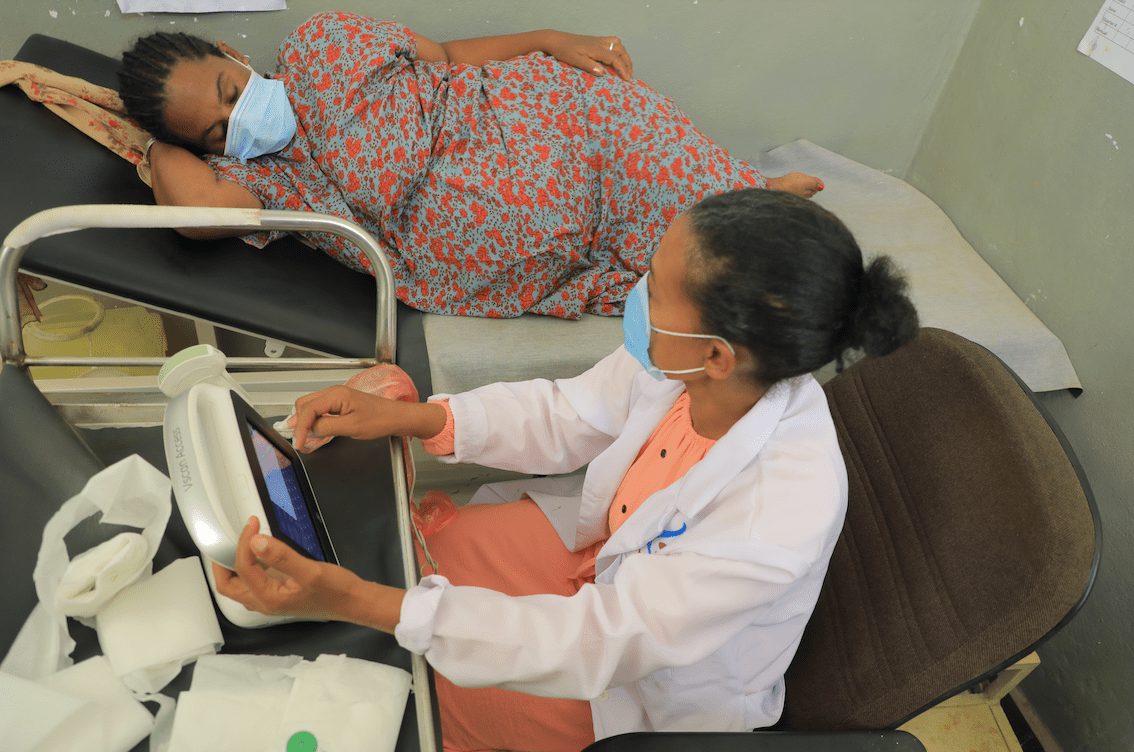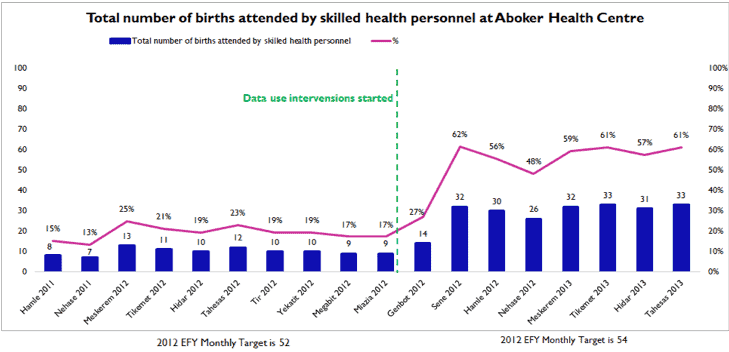Improving Health Service Delivery in Ethiopia through Strengthened Performance Monitoring Teams
May 7th, 2021 | viewpoint
On the morning of March 9, 2021, Lemlem Alemu, who was nine months pregnant, was attending her last antenatal care appointment at the Aboker Health Center in the Harari Region of Ethiopia. She was one of several pregnant women brought to the health center by the family health team, which makes routine community visits and provides multiple services, including home-based care, for those unable to visit the center.

Historically, however, the quality of care, including skilled birth attendance (SBA) at Aboker has been poor. In April 2020, only 9 of 52 women that the health center planned for delivery gave birth at Aboker. Reports indicated that the health center’s poor performance was largely linked to a weak performance monitoring team (PMT), which is supposed to monitor, review, and analyze health center data and performance.
“As members of PMT, we meet to review performances. But nothing concrete comes out of it,” said Muna Ali, Aboker Health Center director and leader of the health center’s transformation. PMT members met regularly to discuss and identify gaps, but would fail to follow up with action plans to fill them.
Resuscitating the PMT
Ineffective PMTs, stemming from a poor data use culture, were ubiquitous across health facilities. When the Ethiopia Data Use Partnership (DUP) and the Harari Regional Health Bureau (RHB), uncovered this issue, they began monitoring and evaluating the PMT discussions, decisions, and actions. This involvement helped identify the underlying problems, which included a general lack of awareness of PMT standards and practices. As a solution, DUP recommended mentorship and supportive supervision for health center staff, coupled with capacity-building training on the PMT standards.

DUP and the RHB worked closely with Aboker Health Center staff to assure PMT members were capacitated and motivated to apply standards and rules. DUP suggested ways to optimize the PMT, and in November 2020, held a capacity-building training to enhance members’ use of data to improve health outcomes.
For the health facility, this was an ‘a-ha’ moment that led to a change of course in its data use practices. “DUP’s hands-on support and mentorship have been extremely useful. It helped us to exactly identify where we had been failing all along,” said Mrs. Ali. As a result of the ongoing effort, Aboker’s PMT transformed from a largely symbolic entity that produced few results into a forum for highly analytical and critical decisions that drive the center’s improved performance.
PMT members have become “proactive data consumers,” said Mrs. Ali. As the PMT started identifying problems, analyzing root causes, and developing and implementing interventions, a perceptible shift in the data use culture began improving health service delivery.
Ensuring Improved Services
One of the gaps that the revitalized PMT identified and prioritized was the low SBA. By applying a problem analysis cycle, the PMT found that inadequate staff commitment and low community awareness were the underlying reasons for the low SBA numbers. To help raise community awareness, the team recommended consolidating a community-level service and adding a particular focus on maternal, newborn, and child health. Through regular visits and conversations, the family health team was able to persuade community members and pregnant women to start and/or resume antenatal care services, and consequently deliver at the health facility. Following months of intensive implementation of the recommended interventions, SBA jumped from 17% in April 2020 to 61% in December 2020, an all-time high for the facility.
 Mrs. Alemu was among the growing group of women who planned to give birth at the facility. “The idea of being helped by [a] skilled person gives you a sense of assurance,” she said as she finished her examination and walked to the counseling room. To maintain progress, Aboker started a campaign called “No More Home Delivery,” which led to improved number of women giving birth at the facility.
Mrs. Alemu was among the growing group of women who planned to give birth at the facility. “The idea of being helped by [a] skilled person gives you a sense of assurance,” she said as she finished her examination and walked to the counseling room. To maintain progress, Aboker started a campaign called “No More Home Delivery,” which led to improved number of women giving birth at the facility.
The health center also showed steady improvement in the HIV positivity yield, which is the proportion of HIV positive results of the total tested. Aboker saw consistent growth from April to December 2020, and recorded the highest performance in the region in 2020.

In addition to improving health service delivery, the strengthening of Aboker’s PMT has fostered a high degree of commitment to data use at all levels. And since the introduction of recognition and incentives, including cellphone airtime, for high-performance, staff commitment and motivation to use data has increased significantly, and a culture of ‘no health data, no health program’ has taken root.
The Take-Away
Aboker demonstrated that the quality of health service delivery is contingent on staff having correct and relevant information to make sound critical decisions. The availability of high-quality data depends on a culture of data use, powered by a strong PMT that ensures quality, monitors performance, and swiftly identifies and corrects problems as they arise.
Written by Benti Ejeta
We strive to build lasting relationships to produce better health outcomes for all.